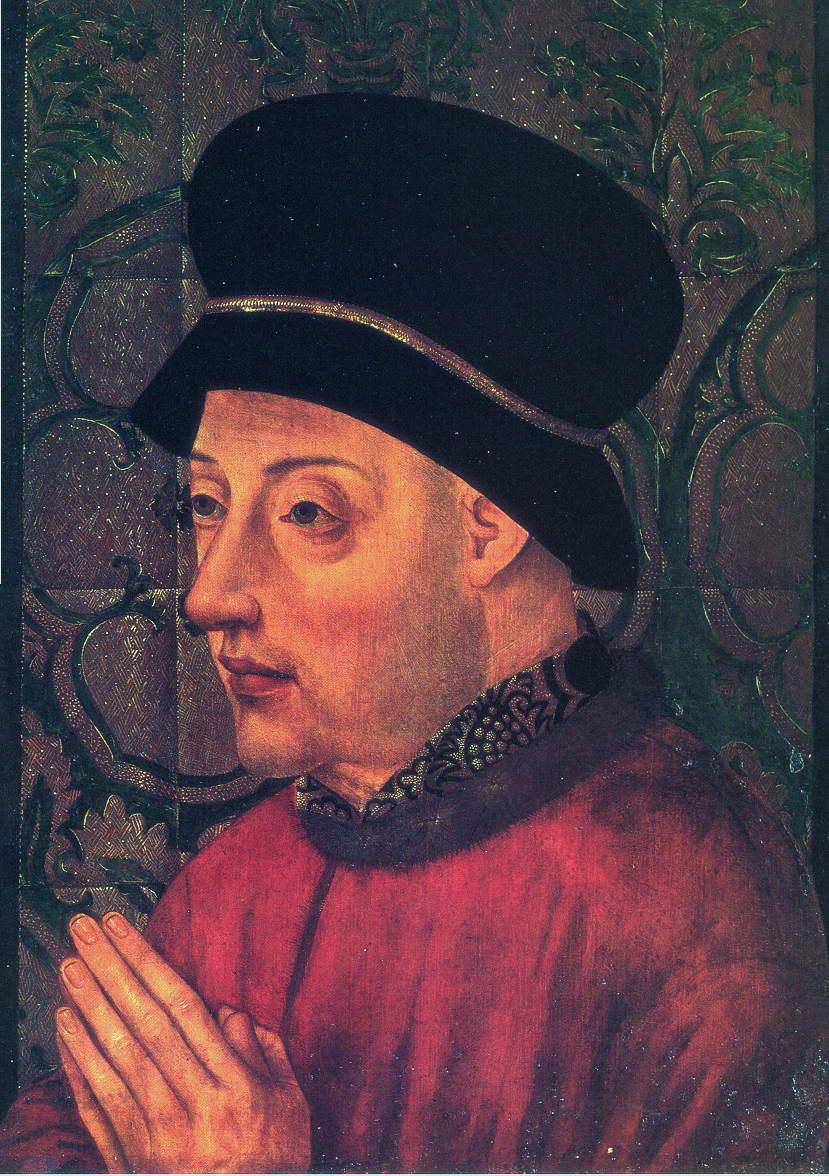- John I of Portugal
Infobox Portuguese Royalty|monarch
name =John I
title =King of Portugal and the Algarve

reign =April 6 ,1385 —August 14 ,1433
predecessor =Beatrice (disputed)
successor =Edward
spouse =Philippa of Lancaster
issue =EdwardInfante Pedro, Duke of Coimbra Henry the Navigator Infanta Isabel, Duchess of Burgundy Infante João, Lord of Reguengos de Monsaraz
Infante Ferdinand, the Saint PrinceAfonso, 1st Duke of Braganza (natural son)Beatrice, Countess of Arundel (natural daughter)
royal house =House of Aviz
father =Peter I
mother =Teresa Gille Lourenço
date of birth =April 11 ,1357
place of birth =Lisbon ,Kingdom of Portugal
date of death =death date and age|1433|8|13|1357|4|11
place of death =Lisbon, Kingdom of Portugal
place of burial =Chapel of the Founder,Monastery of Batalha ,Batalha , District of Leiria,Portugal |John I (Portuguese: "João", pronounced|ʒuˈɐ̃ũ;
Lisbon ,11 April 1357 – Lisbon,14 August 1433 ), called the Good (sometimes the Great) or of Happy Memory, was the tenth King of Portugal and the Algarve and the first to use the titleLord of Ceuta . He was the natural son of Peter I by a noble Galician woman named Teresa Lourenço, daughter of Lourenço Martins, o da Praça, and wife Sancha Martins. In 1364 he was created Grand Master of theOrder of Aviz . He became king in 1385, after the1383–1385 Crisis .On the death of his half-brother Ferdinand I in October 1383, without a male heir, strenuous efforts were made to secure the succession for princess Beatrice, his only daughter. As heiress-apparent Beatrice had married to king
John I of Castile , but the popular sentiment was against an arrangement in which Portugal would have become virtually united with Castile. The1383–1385 Crisis followed, a period of political anarchy, when no monarch ruled the country.On
April 6 1385 , the council of the kingdom ("cortes" in Portuguese) met inCoimbra and declared John, then Master of Aviz, king of Portugal. This was in effect a declaration of war against Castile and its claims to the Portuguese throne. Soon after, the king of Castile invaded Portugal, with the purpose of conquering Lisbon and removing John I from the throne.John I of Castile was accompanied by French allied cavalry while English troops and generals took the side of John (seeHundred Years War ). John I then namedNuno Álvares Pereira , his loyal and talented supporter, general and protector of the Kingdom. The invasion was repelled during the summer after theBattle of Atoleiros and, especially, the decisivebattle of Aljubarrota (August 14 ,1385 ), where the Castilian army was virtually annihilated.John I of Castile then retreated and the stability of John I's throne was permanently secured.On
11 February ,1387 , John I marriedPhilippa of Lancaster , daughter ofJohn of Gaunt , who had proved to be a worthy ally, consolidating theAnglo-Portuguese Alliance that endures to the present day.After the death of John I of Castile in 1390, without leaving issue by Beatrice, John I ruled in peace and pursued the economic development of the country. The only significant military action was the siege and conquest of the city of
Ceuta in 1415. By this step he aimed to control navigation of the African coast. But in longer perspective, this was the first step opening the Arabian world to medieval Europe, which in fact led to the Age of Discovery with Portuguese explorers sailing across the whole world. It should be noted that the global Muslim population had climbed to about 8 per cent as against the Christian population of 14 per cent by 1400.Contemporaneous writers describe him as a man of wit, very keen on concentrating the power on himself, but at the same time with a benevolent and kind personality. His youthful education as master of a religious order made him an unusually learned king for the Middle Ages. His love for knowledge and culture was passed to his sons: Duarte, the future king, was a poet and a writer, Pedro, the duke of Coimbra, was one of the most learned princes of his time and Prince
Henry the Navigator , the duke of Viseu, started a school of navigation and invested heavily in science and development of nautical topics. In 1430, his only surviving daughter, Isabella, marriedPhilip the Good, Duke of Burgundy and enjoyed an extremely refined court in his lands; she was the mother ofCharles the Bold .Genealogical data
Ancestors
Marriages and descendants
John I married at Oporto on
February 2 1387 Philippa of Lancaster , daughter ofJohn of Gaunt, 1st Duke of Lancaster andBlanche of Lancaster . From that marriage were born several famous princes and princesses of Portugal (Infante s) that became known as the Illustrious Generation ( _pt. Ínclita Geração).-
Sources:
Williamson, D. 1988. ‘’Debrett’s Kings and Queens of Europe’’
Wikimedia Foundation. 2010.
